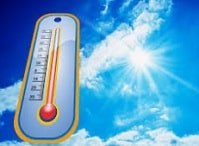 The Royal Spanish Academy ( RAE ) recognizes more than fifteen meanings of the term much , which comes from the Latin word multus . It is an adjective that refers to what is large, profuse, excessive or intense .
The Royal Spanish Academy ( RAE ) recognizes more than fifteen meanings of the term much , which comes from the Latin word multus . It is an adjective that refers to what is large, profuse, excessive or intense .
For example: “It's so hot! Let's go drink something cool” , “For a long time I was unemployed, but luckily now I have a well-paid job” , “I'm very scared, let's get out of here” .
The idea of a lot is subjective and usually depends on the context . Let's return to our first example: what temperature must be recorded to affirm that it is “very hot” ? Perhaps for one person, a thermometer reading 24 °C is “very hot” , while another individual may consider that it is “very hot” above 30 °C .
On the other hand, just because five bottles of wine were drunk at a dinner does not mean that “a lot” or “little” alcohol was consumed. If there were twenty diners, the amount of wine consumed is limited; On the other hand, if those who dined were only three people, it can be said that they drank “a lot” of wine.
Sometimes the notion of a lot is used to refer to a plurality or to ponder : “In this country there are a lot of scoundrels, be careful,” “I think it's a lot of car for a teenager who is just taking his first steps as a driver.”
Finally, a lot can be used to indicate the great difference that exists between two realities, magnitudes or quantities compared : “Juan is much more hard-working than Ricardo, that is why he has a better economic position” , “Your lasagna is much tastier than the mine, how do you prepare it?” , “I went through a difficult time, but now I am much calmer.”
A very common confusion in our language takes place between the terms a lot and too much , although their meanings are very different: "a large amount" and "in excess", respectively. At first glance, we can say that the first is usually used to describe magnitudes that are related to less drastic consequences than the second. For example, drinking a lot of alcohol is not as serious as drinking too much alcohol: the first case can lead to an upset stomach with dizziness, while the second can lead to an alcohol coma.
 In everyday speech these two terms are used incorrectly in many areas, and in this way the nuances that distinguish them are wasted. If someone says in the middle of an expedition in the sun's rays "I'm very thirsty", for example, we can understand that they can continue ahead although it would be very good for them to drink some water to hydrate themselves; However, if you told us that you are "too thirsty," we should probably worry because you could pass out at any moment if you don't drink something soon.
In everyday speech these two terms are used incorrectly in many areas, and in this way the nuances that distinguish them are wasted. If someone says in the middle of an expedition in the sun's rays "I'm very thirsty", for example, we can understand that they can continue ahead although it would be very good for them to drink some water to hydrate themselves; However, if you told us that you are "too thirsty," we should probably worry because you could pass out at any moment if you don't drink something soon.
In romantic relationships, it is common to use this word to emphasize phrases that indicate love or concern for the other. For example: "I love you very much," "Every time you leave I miss you so much." It could also serve to reproach the other's attitudes: "You have hurt me a lot and I don't know if I can get over it," "It hurts me a lot that you talk to me this way, especially when we are with our friends."
For these cases, the superlative is very appropriate, that is, the form of the word that indicates the degree of greatest intensity of its meaning; The superlative of much is very much . Note that there is no superlative for the term too much , but if we wanted to increase its intensity we should probably use absolutely or totally , among others.
Returning to the previous examples, if we replace a lot with its superlative, the expressions of affection become deeper and more spontaneous, they seem more sincere and natural in speech: "I love you very much," "I miss you very much." In the same way, the reproaches intensify: "Your words have hurt me a lot."
